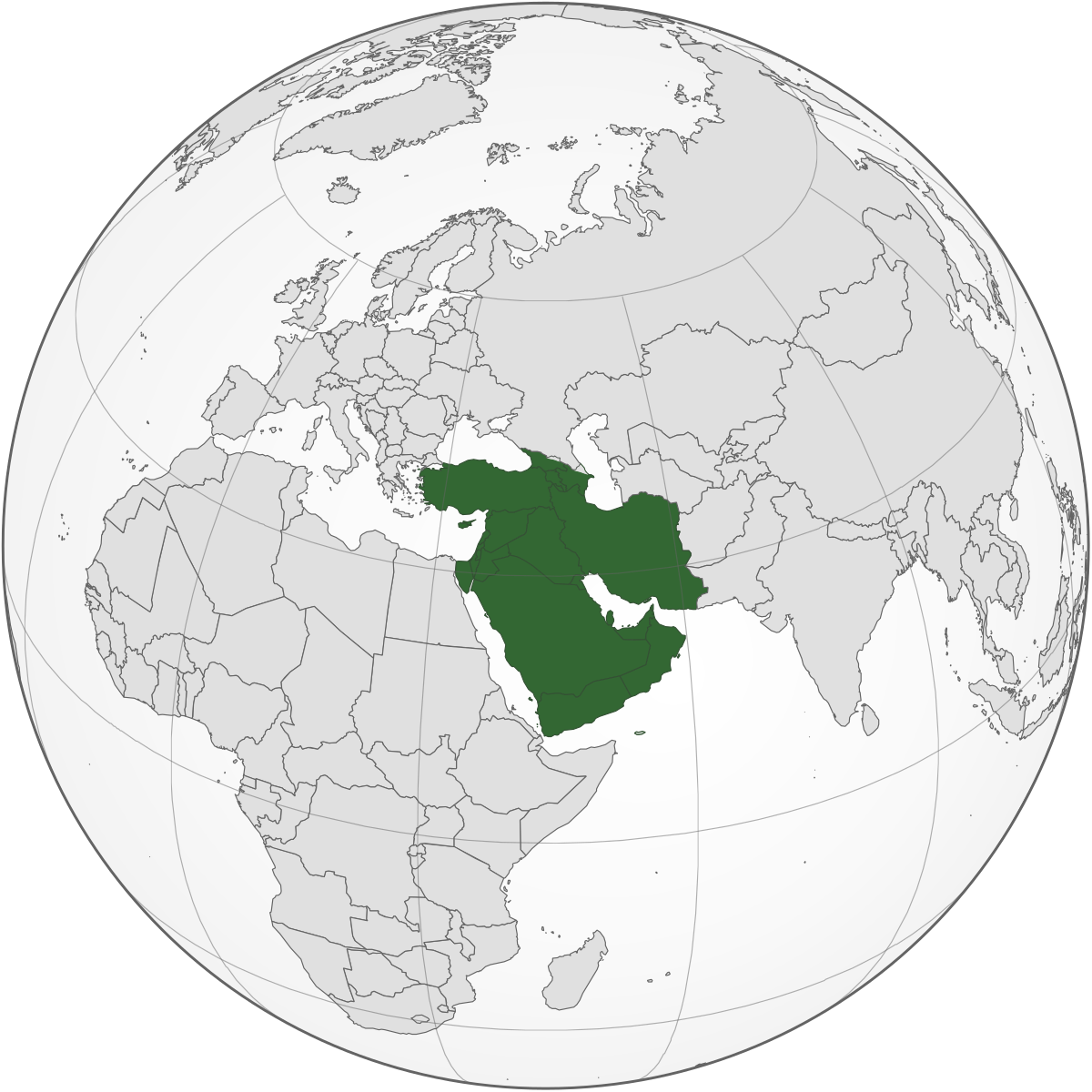More languages
More actions
(Expanded) Tag: Visual edit |
General-KJ (talk | contribs) m (Added category) Tag: Visual edit |
||
| (3 intermediate revisions by 3 users not shown) | |||
| Line 1: | Line 1: | ||
{{Infobox country|name=West Asia|largest_city=Tehran|image_map=Western Asia (orthographic projection).svg.png|image_map_size=320px|area_km2=5,994,935|population_estimate=313,450,000|population_estimate_year=2018}} | |||
'''West Asia''', also known as '''Western Asia''' or the '''Middle East''' in the [[western world]], is a geographical region bordering [[Europe]], [[Africa]], and the rest of [[Asia]]. It encompasses [[Republic of Armenia|Armenia]], [[Georgia (country)|Georgia]], [[Republic of Azerbaijan|Azerbaijan]], [[Republic of Iraq|Iraq]], [[Islamic Republic of Iran|Iran]], [[Syrian Arab Republic|Syria]], [[Republic of Türkiye|Türkiye]], [[State of | |||
'''West Asia''', also known as '''Western Asia''', or the '''Middle East''' in the [[western world|Western World]], is a geographical region bordering [[Europe]], [[Africa]], and the rest of [[Asia]]. It encompasses [[Republic of Armenia|Armenia]], [[Georgia (country)|Georgia]], [[Republic of Azerbaijan|Azerbaijan]], [[Republic of Iraq|Iraq]], [[Islamic Republic of Iran|Iran]], [[Syrian Arab Republic|Syria]], [[Republic of Türkiye|Türkiye]], [[State of Palestine|Palestine]] (including [[State of Israel|occupied territories]]), [[Hashemite Kingdom of Jordan|Jordan]], [[State of Kuwait|Kuwait]], [[Kingdom of Bahrain|Bahrain]], the [[United Arab Emirates]], [[State of Qatar|Qatar]], [[Kingdom of Saudi Arabia|Saudi Arabia]], [[Republic of Yemen|Yemen]], [[Sultanate of Oman|Oman]], and a part of [[Arab Republic of Egypt|Egypt]]. | |||
Western Asia has also been a target of [[colonization]] by [[Imperial core|Western]] [[Imperialism|imperialists]] for centuries. The region has been a strategic and economic prize for imperial powers, with its vast oil reserves, strategic location, and historical significance. Colonization by Western imperialists can be understood in the context of imperialism and [[Capitalism|capitalist]] [[exploitation]]. The imperial powers sought to control the resources and [[labor]] of the region in order to further their own economic and political interests.<ref>{{Citation|author=Lenin, V.I.|year=1902|title=Imperialism, the Highest Stage of Capitalism|city=New York|publisher=International Publishers}}</ref> | |||
This [[exploitation]] has led to the subjugation of local peoples, the erosion of indigenous cultures and identities, and the imposition of Western political and economic systems. This is known as [[cultural hegemony]] where imperial nations impose their own culture and way of life over the colonies.<ref>{{Citation|author=Gramsci, A.|year=1971|title=Selections from the Prison Notebooks|city=New York|publisher=International Publishers}}</ref> | |||
Additionally, the Western imperialists have also supported and propped up dictatorial regimes in the region in order to maintain control and access to resources. This is known as [[dependency]] where imperial nations exploit their colonies for their economic gain.<ref>{{Citation|author=Foster, J.B.|year=1997|title=Imperialism and the Law of Value|city=New York|publisher=Monthly Review}}</ref> | |||
== References == | |||
<references /> | |||
[[Category:Regions of Asia]] | |||
Latest revision as of 21:39, 16 August 2024
| West Asia | |
|---|---|
 | |
| Largest city | Tehran |
| Area | |
• Total | 5,994,935 km² |
| Population | |
• 2018 estimate | 313,450,000 |
West Asia, also known as Western Asia, or the Middle East in the Western World, is a geographical region bordering Europe, Africa, and the rest of Asia. It encompasses Armenia, Georgia, Azerbaijan, Iraq, Iran, Syria, Türkiye, Palestine (including occupied territories), Jordan, Kuwait, Bahrain, the United Arab Emirates, Qatar, Saudi Arabia, Yemen, Oman, and a part of Egypt.
Western Asia has also been a target of colonization by Western imperialists for centuries. The region has been a strategic and economic prize for imperial powers, with its vast oil reserves, strategic location, and historical significance. Colonization by Western imperialists can be understood in the context of imperialism and capitalist exploitation. The imperial powers sought to control the resources and labor of the region in order to further their own economic and political interests.[1]
This exploitation has led to the subjugation of local peoples, the erosion of indigenous cultures and identities, and the imposition of Western political and economic systems. This is known as cultural hegemony where imperial nations impose their own culture and way of life over the colonies.[2]
Additionally, the Western imperialists have also supported and propped up dictatorial regimes in the region in order to maintain control and access to resources. This is known as dependency where imperial nations exploit their colonies for their economic gain.[3]
References[edit | edit source]
- ↑ Lenin, V.I. (1902). Imperialism, the Highest Stage of Capitalism. New York: International Publishers.
- ↑ Gramsci, A. (1971). Selections from the Prison Notebooks. New York: International Publishers.
- ↑ Foster, J.B. (1997). Imperialism and the Law of Value. New York: Monthly Review.
